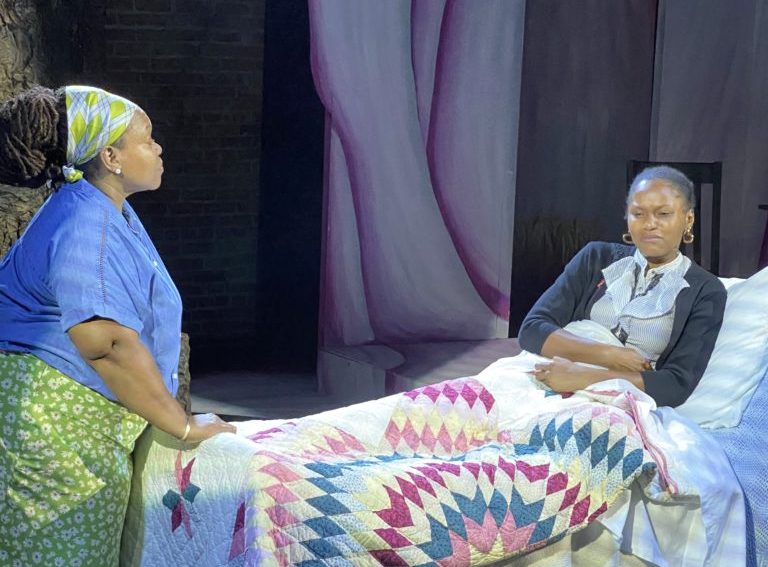
Much has changed about AIDS since the days when most who were infected died. And the stigma was real. Now, HIV can be treated and prevented. But there’s still work to do, which is why local artist and health educator Cynthia Harris wrote the play, “The Calling is in the Body.”
The play is based on her experience as a teenager in Nashville, when she met a brave advocate who was working to stop the spread of HIV by going public with her own status.
“It’s a hero story,” Harris says. “It’s my thank you to a woman who did something very brave and that we look at as our patron saint of radical visibility.”
A teenage Harris is one of the characters in the play. In one early scene, she’s processing her uncertainties and fear about AIDS.
Young Cynthia: At first the news said it was white gay men in big cities like New York or Los Angeles. Then they said you could get it from your needles doing drugs — I learned about that in middle school science class. How could it be just one group of people? It’s all so confusing and doesn’t make any sense!
The play is set in 1990, the height of the AIDS pandemic. Harris recalls her own experiences as a high school student at the time.
“It was really scary,” she says. “We didn’t know exactly what it was and we were hearing this word. We didn’t even say it. If you suspected that somebody was HIV positive or had AIDS, you know, they might … have ‘that thang.’ And we weren’t getting clear information at first. We thought, ‘Is it OK if we share a drinking cup? Is that a problem? What about a toilet seat? Kissing?’ ”
The play is a true story, centered around Deidre Davenport, a college student in Nashville who planned to become a pediatrician. In Act One, she finds out she has AIDS — transmitted from her college sweetheart. She is tearful, angry and afraid in a scene where she tells her grandmother about her status.
Deidre: How did he not care about us to know? Or did he know and just not tell me. I had to find out by donating at a Red Cross blood drive! And what about school? What are my friends gonna say?
Grandma: So what are you gonna do about it? Baby, no matter what happens, your body is a gift. Your force, your purpose your calling, your power is always in your body.
That conversation inspires the young, 20-something woman to begin speaking out about her condition. Harris remembers meeting her when she spoke at a church youth camp.
“And she’s warm and she’s personable and we’re connecting because she looks like us, she is not much older than we are, and she’s going to [Tennessee State University] and we’re from Nashville, so some of us are going to go there, too,” says Harris.
“And then she blows our minds and tells us that she has HIV and AIDS.”
In that scene, Harris’s character and other youth are eager to learn from Deidre, and bombard her with questions.
Young Cynthia: She was a smart, Black girl like me. How could someone like me have HIV?
Deidre: You can not tell someone has HIV just by looking at them. I mean, did you think I was positive when I walked in?
Teens: No!
Deidre took her message about HIV and safe sex to schools, churches and prisons. But by the age of 27, she had died from complications of AIDS. Still, her radical approach was taking off in pop culture.
“She wanted people to be shocked because she wanted them to take their health very seriously,” Harris explains. “And then we get Magic Johnson in ‘91 coming out and saying that he’s HIV positive. And I think that really shifted things for Black people.
“We started to see hip hop artists say more and more about it. We see TLC wearing condoms on their outfits and Salt-N-Pepa singing songs about ‘Let’s Talk About Sex.’ ”
Harris hopes her play will continue this important work with a new generation — who no longer sees HIV/AIDS as a death sentence and who can pop one pill and prevent transmission or treat it.
Ironically, she wrote this play during the early days of COVID-19, before vaccines arrived.
“All of that kind of panic and confusion that can happen around an epidemic or a pandemic. There was definitely deep similarity there. And the outspoken people we may hear from today and the language that we have about protection, safety, consent — all of that comes, in my mind, from this experience and from developing strategies because of HIV and AIDS.”
The entire stage play “The Calling is in the Body” can be viewed on YouTube:

